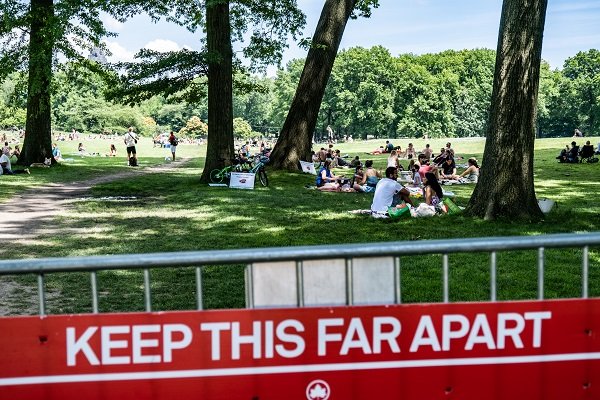
In April of this year, polls indicated widespread support for lockdowns to stop the spread of COVID-19. Stories emerged of people shaming and reporting their neighbors for even minor social distancing violations. Formal enforcement of the myriad of new rules disproportionately affected people of color. While these developments presumably created concerns about authoritarianism and infringement of civil liberties and rights, public sentiment and the messaging from experts seemed to imply that — at least for the time being — public health needed to be protected at any cost.
By late May, a shift had occurred. The killing of George Floyd by a police officer sparked widespread protests — which created clear public health risks — to fight police brutality and racial injustice. Polls indicated that almost two-thirds of Americans supported these protests. Many public health experts were even on board. Over the same period, general social distancing behavior also decreased.
This shift illustrates an important principle in economics: There are no absolutes; there are only trade-offs. Society values civil liberties (including the right to protest), livelihoods, and social connection — and it also values disease prevention. The best solution is unlikely to involve being at one extreme or the other.

Of course, there’s a large range between the two extremes. That range gives rise to an important question: During a pandemic, to what extent are people willing to make tradeoffs between public health and other important values? In a recent National Bureau of Economic Research working paper, researchers conducted cross-country surveys to address this question. In particular, they tried to determine the extent to which individuals are willing to sacrifice civil liberties for public health.
The survey reveals large
cross-country differences. For example, respondents were asked to rate their
agreement with the following statement: “I am willing to sacrifice my own
rights and freedom during a crisis like the current one, in order to maintain
the health and well-being of the whole society.” Responses could range from 0
(completely disagree) to 10 (completely agree). Overall, the survey indicates
that 23 percent of US residents responded to this question with a 4 or lower.
That share was lower in European countries, and still lower — around 5 percent —
in China. However, it was higher in Japan.
The researchers further find significant individual differences — even within countries — in willingness to sacrifice rights for public health. Perhaps not surprisingly, those who are more exposed to the health risks of COVID-19 are more willing to sacrifice civil liberties for public health. There are also demographic differences. For example, as one of the researchers notes in an opinion piece about the study:
People with less education and weaker attachments to the labor force, or (in the case of the US) are members of racial and ethnic minorities, are less willing to trade off their rights than are other groups, even in the face of heightened health risks. Perhaps being able to accept restrictions on civil liberties is a “luxury” that members of these groups, who may have a long history of exclusion and abuse, cannot afford, so they view any such restrictions as a threat to their lives and livelihoods. It also is possible that those who are more economically advantaged already have their interests well represented by policymakers, and don’t necessarily have to rely on free speech and assembly, much less worry about state surveillance.
The researchers also conducted an experiment in which some respondents were initially shown a message that emphasized public health concerns, while others were initially shown a message that emphasized civil liberties concerns. Those who were shown the public health message indicated greater willingness to give up civil liberties for public health. This result may indicate the importance of messaging — not only by policymakers and the media, but also by family and friends — in shaping individual attitudes.
Finally, the researchers find that willingness to sacrifice civil liberties for public health has declined globally since March. That’s consistent with polls showing that, as the pandemic enters its ninth month in the US and pandemic fatigue sets in, Americans have become more willing to take risks with COVID-19 to pursue other activities they value. It’s also consistent with the strong pushback European governments are getting as they reimpose lockdown measures.
The COVID-19 pandemic gives rise to a difficult tradeoff between public health and other values — including civil liberties. Being at one extreme on this tradeoff is generally undesirable for either policymakers or individuals. Policymakers can benefit from understanding how individuals weigh the different values involved. As individuals, we can also benefit from understanding why others might weigh values differently and reach different conclusions than we do. That understanding could help defuse the contentious politics around COVID-19 and reduce the vilifying of those who see the issues differently.
The post The tradeoff between civil liberties and public health appeared first on American Enterprise Institute – AEI.
